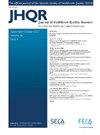Evaluation of the degree of implementation of zero projects in critical care units of Galicia (Spain) through internal audits
IF 1
Q4 HEALTH CARE SCIENCES & SERVICES
引用次数: 0
Abstract
Objective
The objective of this study was to assess the implementation of Zero Projects in Critical Care Units (CCUs) through Internal Audits (IA).
Materials and methods
Design: Real-time observational safety analysis. A questionnaire was developed with defined items to ensure objectivity. After IAs, a survey was conducted with the auditors. Scope: 11 CCUs in hospitals of the Servizo Galego de Saúde and Ribera-POVISA. Patients or participants: 24 auditors in 9 teams composed of medical, nursing, and quality personnel from health areas and 34 patients were assessed. Main variables of interest: Compliance with the quality standard (≥60% of items), strengths, areas for improvement, auditor's interest in IA, conformity with the organization and items.
Results
100% CCUs met the quality standard. 18.03% of items were fulfilled by all CCUs. Strengths: staff motivation, positive reception of auditors, and use of computer tools in some CCUs. Areas for improvement: deficit of automatic systems for controlling endotracheal tube cuff pressure (compliance rate in 9.1% of CCUs), training needs, communication issues, and not using checklists (45.5% of the reports). Auditors found IA very interesting, and 19% suggested improving organization and items.
Conclusions
All CCUs met the previously agreed-upon quality standard. Numerous improvement opportunities were identified and communicated to the audited CCUs. For greater homogeneity and objectivity, a review of previously agreed items and definitions is required.
通过内部审计评估加利西亚(西班牙)重症监护室零项目的实施程度。
研究目的本研究旨在通过内部审计(IA)评估重症监护病房(CCU)零项目的实施情况:设计:实时观察安全分析。为确保客观性,制定了一份问卷,其中包含明确的项目。内部审计结束后,对审计人员进行调查:患者或参与者:由来自卫生领域的医疗、护理和质量人员组成的9个小组的24名审核员和34名患者接受了评估:主要关注变量:是否符合质量标准(≥60%的项目)、优势、有待改进的领域、审核员对内部审计的兴趣、与组织和项目的一致性:结果:100%的协调单位符合质量标准。结果:100%的协调单位达到了质量标准,18.03%的项目得到了所有协调单位的满足。优点:工作人员积极性高,审计员接待积极,一些协调单位使用了计算机工具。需要改进的方面:气管插管袖带压力自动控制系统不足(9.1%的CCU达标)、培训需求、沟通问题以及未使用核对表(45.5%的报告)。审核员认为内审非常有趣,19%的审核员建议改进组织和项目:所有CCU都达到了之前商定的质量标准。发现了许多改进机会,并向接受审核的CCU进行了通报。为提高一致性和客观性,需要对之前商定的项目和定义进行审查。
本文章由计算机程序翻译,如有差异,请以英文原文为准。
求助全文
约1分钟内获得全文
求助全文
来源期刊

Journal of Healthcare Quality Research
Medicine-Health Policy
CiteScore
1.70
自引率
8.30%
发文量
83
审稿时长
57 days
期刊介绍:
Revista de Calidad Asistencial (Quality Healthcare) (RCA) is the official Journal of the Spanish Society of Quality Healthcare (Sociedad Española de Calidad Asistencial) (SECA) and is a tool for the dissemination of knowledge and reflection for the quality management of health services in Primary Care, as well as in Hospitals. It publishes articles associated with any aspect of research in the field of public health and health administration, including health education, epidemiology, medical statistics, health information, health economics, quality management, and health policies. The Journal publishes 6 issues, exclusively in electronic format. The Journal publishes, in Spanish, Original works, Special and Review Articles, as well as other sections. Articles are subjected to a rigorous, double blind, review process (peer review)
 求助内容:
求助内容: 应助结果提醒方式:
应助结果提醒方式:


